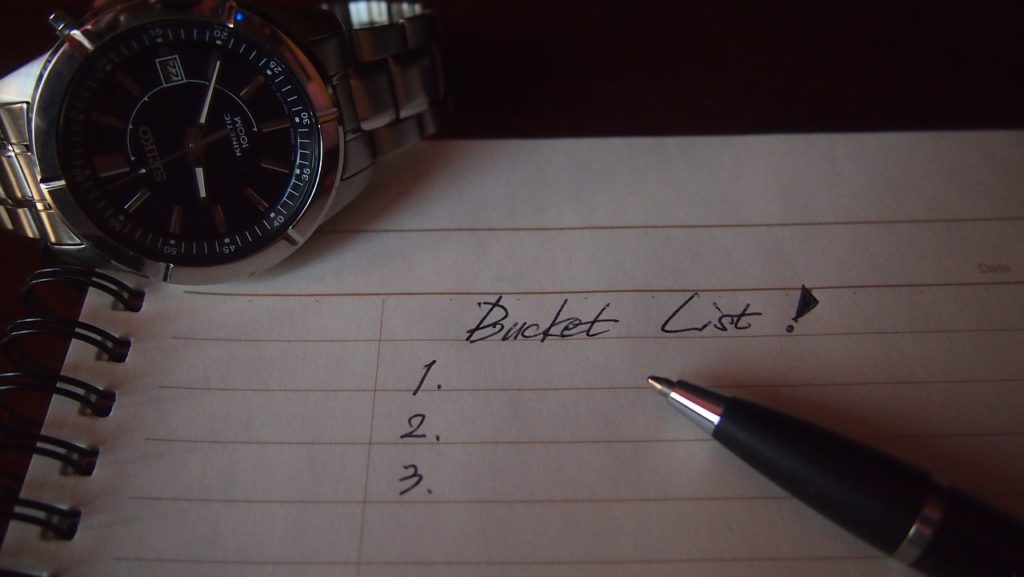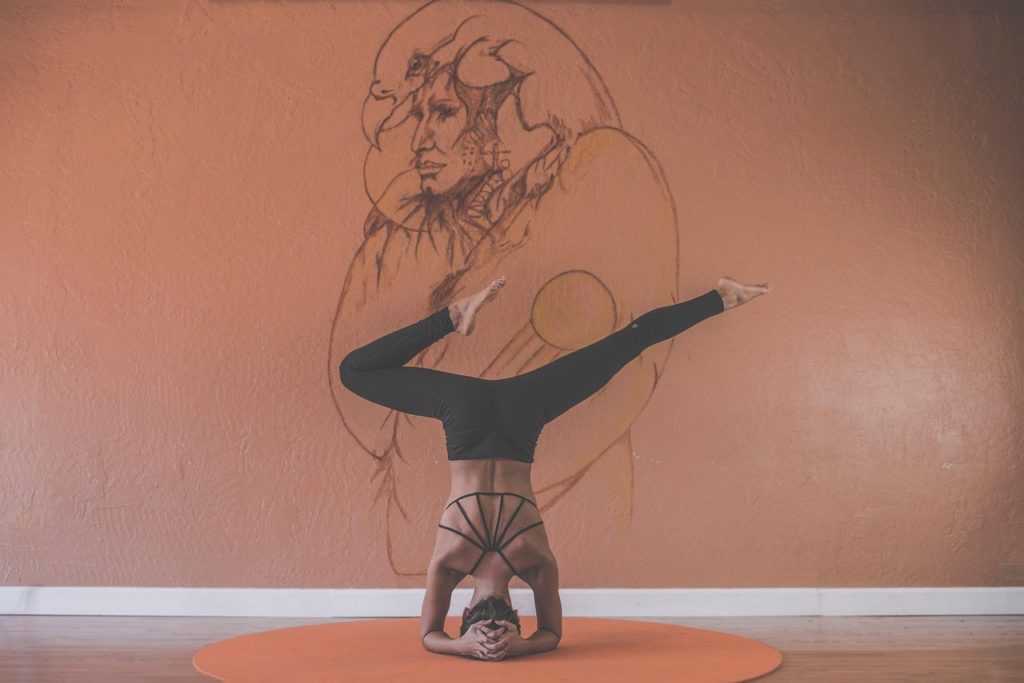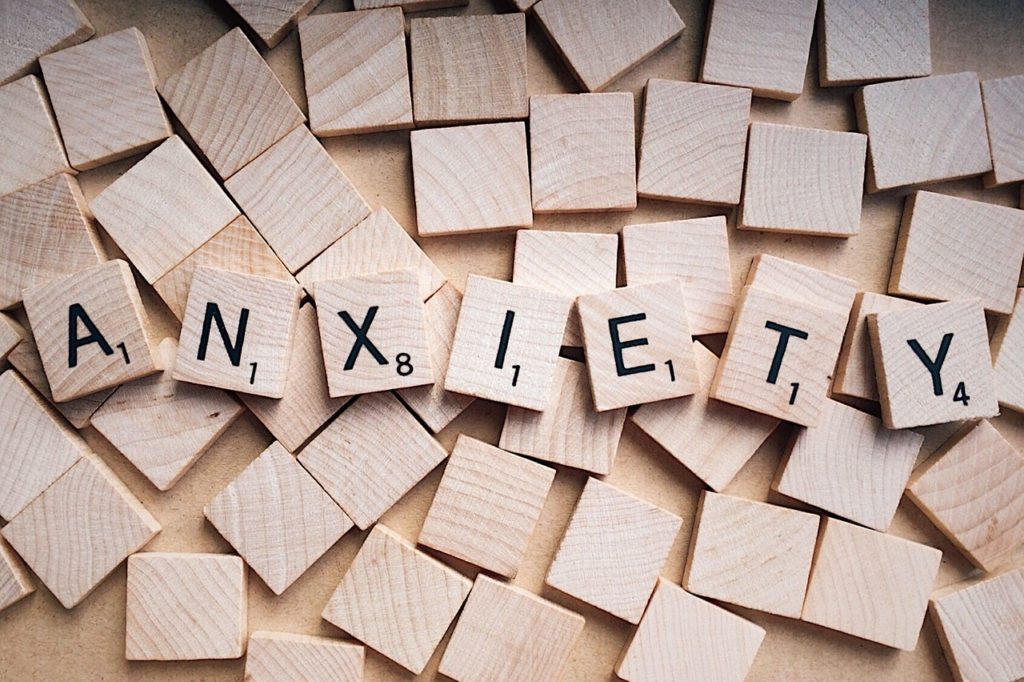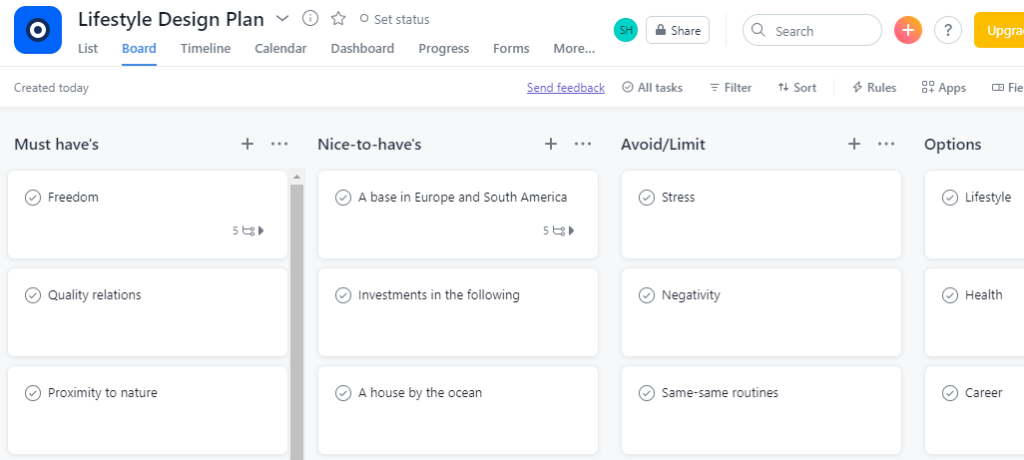Knowing what you want in life is the first step towards getting it.
While this sounds annoyingly simple, you’re not alone if you’re feeling lost.
We’re surrounded by more options than Lou Bega in the Mambo no. 5 song and, apparently, not very good at predicting what makes us happy.
But don’t worry.
Whether you’re looking for your next big move, or just feel as if it’s time to review your current situation — these questions will help you start figuring out what you want in life. Remember that the only difference between a dream and a goal is a plan. Therefore, I’ve also included a simple template at the end which you can use to put those lovely ideas into action.
Ready? Let’s dive in.
What makes me happy?

Think about those times when you felt at your best. What made you feel that way?
Break this question down by asking yourself:
- What do I love doing?
- What makes me feel fulfilled?
- What “work” doesn’t feel like work?
- What makes me lose track of time?
What does a perfect day look like?

From the moment you wake up, until you’re going to bed. How would you spend your time?
This question helps you clarify what activities that make you feel good, without any musts or demands.
If I had no limits, what would I do this week, this month and this year?

Now, let’s take a longer-term perspective.
Limits could be anything from money to fear, priorities, or expectations from those around you.
If you could do anything (or didn’t have to do anything), what would you do?
How would I describe the future version of myself?

The way we look at ourselves strongly affects our life choices. This question emphasizes that your past doesn’t need to prevent your future.
If you don’t believe you can have what you want, you’re probably right. If your expectations aren’t aligned with what you want, you won’t be able to realize your dreams, either. Leave all your self-limiting beliefs aside for a while, and ask where you see yourself in the future, if anything was possible?
Think about this in terms of well-being (mentally, physically, etc.), lifestyle (work/life balance, family, geographical location, etc.), financial situation (assets, savings, a house by the ocean?), and so on.
What are my values?

If your life isn’t aligned with your values, it’s easy to feel lost.
Explore what’s important to you with an open mind. Think about meaningful moments, situations that made you upset, and what you must have in your life to feel fulfilled.
- Create a list of your most important values and organize them into 5-10 categories.
- Rank your values based on importance. Don’t rush this process if you find it tricky.
- Create a first draft and review it again tomorrow. Repeat until you feel good about your values.
- Be honest to yourself and make sure to list values that are aligned with who you are. Don’t base them on “what seems right” or “shoulds” in society. Feel free to list everything from freedom and accomplishment, to fun and passion.
If you get stuck, check out this list of 200+ core values for inspiration.
When you’re clear on your values, it’s easier to make decisions. If you need variation, cultural diversity and a happening vibe, you might realise that being based in a bigger city is your thing – at least for parts of the year. Traveling or a new project might meet your need for adventures, and so on.
What are my health goals?

Be aware of how you feel and would like to feel in the future. Take this into consideration when you’re designing your ideal lifestyle. Map out what you need to feel good and areas that can be improved.
This can cover everything from proper rest and regular work-outs, to eating habits and mindfulness.
What are my career goals?

With your answers so far in mind, zoom in on your career.
The following questions help you break this down:
– What do I enjoy doing?
– What am I good at?
– Can I make that profitable?
– What kind of work environment do I need?
– What career options would fit my preferred lifestyle?
– What does the future look like within those areas?
Learn from previous work experiences, too. Analyze what you liked the most, and what you would like to skip in the future. Talk to people who are having careers that you’re curious about. Understand downsides, what a typical day can be like, how it may develop in the future, and earning potential.
Research and learn what it would take to build those careers. Ask yourself if that still is what you want.
What kind of people do I want in my life?

All of us need real connections. Social connections can decrease anxiety, depression, and improve your well-being in so many ways. Ranging from your self-esteem to your immune system.
What are your relationship goals? What kind of people do you want in your life, or do you need to let go of? This could cover everything from toxic relations to mentors, or new friends that better match the current phase of your life. You might have discovered a new interest or a new side of yourself. If your lifestyle and focus are different in comparison with your closest circle, it can be refreshing and rewarding to share experiences with new people who are going through something similar.
Don’t underestimate the effect of the people you choose to spend time with. Your social network influences your way of thinking, your decisions, and your self-esteem.
If I’m 80+ years old and look back, what would I be most grateful for?

Another check-in on your priorities and what you choose to focus on in life.
You probably won’t regret having spent time with people that matter, or that you were present in the moment and appreciated those small things.
Maybe you’ll be grateful for experiences that were tough, because they taught you something. Including losing someone important, since what you shared was rare in a beautiful way. Being left with only memories reminded you of how precious life is.
Perhaps you’ll think about the gorgeous places you were lucky to visit or the amazing food you eat (foodies relate). You’ll recall some of your best adventures and people who made you smile.
This question also works as a reminder that most things you’re worrying about won’t matter in the future. So… they are probably not worth worrying about now, either. What deserves your time instead?
What do I want to avoid or limit in my life?

As helpful as understanding what you want, is getting an overview of what you don’t want. Stress, negativity, toxic people, or things that don’t get you excited are a few examples.
Once you have identified what you don’t want, ask yourself what you would rather prefer.
What does success mean to me?
Defining success is deeply personal and often evolves as we grow and change. This question cuts to the core of what truly matters to you, beyond societal expectations or material benchmarks. It invites you to envision success not just in terms of career achievements or financial milestones, but as a holistic sense of fulfillment.
Do you see success as achieving a perfect balance between work and personal life, or does it mean making a significant impact in your community or industry? Perhaps success to you means freedom—the ability to choose where you live, whom you spend time with, and how you spend your days.
Take a moment to reflect on what makes you feel accomplished and satisfied. Is it the pursuit of knowledge and skills, the stability and security of a loving home, or the thrill of new experiences? Whatever your vision, acknowledging it is the first step toward making it your reality.
Am I willing to put in the work to get what I want?

Once you get clear on what you think you want, the next step is to put yourself into what that actually means. Sometimes we think we want something, but change our minds as we learn more about it.
This is good since it means that you know you want something else instead.
I remember wanting to be a fashion designer as a teenager. I got hooked on the idea and started to learn everything about it. I even bought those large sketchbooks and started to draft my first collection.
It wasn’t pretty.
This would have been fine if it was what I really wanted. What I realized though, is that I like clothes, but not making them. That’s very different. 😉
Many people tell me that they would like to “work from their laptop and travel”. If we skip the detail that it isn’t a job in itself – great, becoming location-independent might be your best decision ever.
With that said, it comes with a lot of discipline and hard work.
Many jobs and lifestyles have sides that we don’t always think about. Which is fine, if you’re committed enough. You get it. Just do your research, explore your alternatives, and experiment your way forward.
Transform your wants into options and an action plan

A list of what you want alone won’t do much for you. Now it’s time for action.
Use a tool like Asana or Trello to get an organized overview of your ideal lifestyle.
- Create a column for must-haves in your life (freedom, deep connections, an international environment, etc.), nice-to-haves (a house by the ocean, proximity to nature, etc.), and things you would like to avoid (stress, negativity), etc.
- Summarize these insights into options. Since we started with the “why” instead of the “what”, you will automatically end up with options based on what’s important to you. Knowing how essential freedom, productivity, and new experiences are for me, helped me realize that I should run my own location-independent business instead of having a traditional 9-5 job, for example.
- Create a column for different options. Categorize these in a way that makes sense to you, such as Career, Lifestyle, Relationships, or however you think about it.
- You can also set up different boards for different categories (one for Career, Lifestyle, etc).

- You don’t need to know exactly what form something should take at this point. I’ve criteria for my future home-base for example, which I regularly update, and different places match those. Just like different career paths may match your priorities, and so on.
- Add one more column for action points, where you outline what actions you need to take on a short-term and long-term basis to realize your goals or experiment with your options. Specify how you will follow-up and evaluate whether this is something you really want.
- Deciding what you want today doesn’t mean you can’t change your mind in the future. Review your situation on a regular basis and change direction when needed. I’ve tweaked my lifestyle a lot over the years, since it’s impossible to predict how things and preferences will evolve.
Have fun as you discover what you want in life. Once you get clear on your priorities and what kind of lifestyle that gets you excited, it’s easier to feel fulfilled and transform your wants into action.
So, do you know where you’re going?







this was really complete and healpful, thank u!
Happy to hear that Bruna 🙂